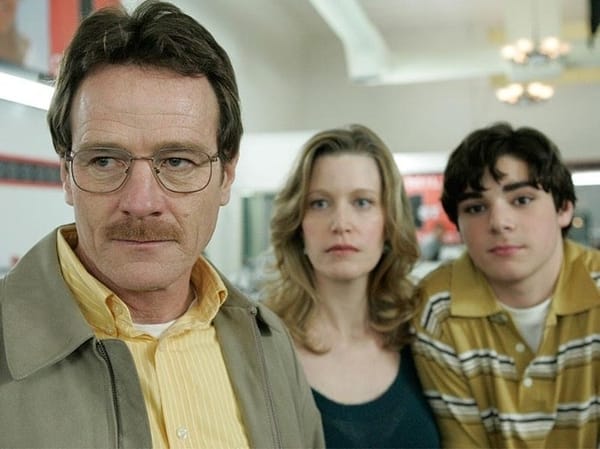Welcome to Original Characters, an ongoing series of Industrial Scripts articles examining the most original characters to appear in both TV and film. This article will focus on Walter White from Breaking Bad.
Table of contents
- What is an Original Character?
- Who is Walter White?
- Complex, Three-Dimensional Characters
- Supporting Characters in Breaking Bad:
- Jesse and Walter’s Relationship:
- Walter White as a Father Figure?
- Walter White: Hero Or Villain?
- Walter’s Motivation And Purpose:
- Who is ‘Heisenberg’?
- Masculinity in Breaking Bad:
- Walter as a Husband And Father:
- Skyler White
- Walter White: A Good Father?
- Walter’s Character Development:
What is an Original Character?
It’s a character that sticks with you even when they’re long gone from your screens.
It’s a character that serves as a reference point in casual conversation or a character that sums up a behaviour or generation.
original, adjective
“not the same as anything or anyone else and therefore special and interesting…”
— from The Cambridge English Dictionary
Most importantly, in screenplay terms, an original character is a character that shines through in spite of any other weaknesses within that screenplay.
For a Screenplay Reader or Development Executive an original character is an element of a script that shines through everything else. No matter how busy they are or no matter how much work other elements of the script need, the original characters stand out.
Great characters are at the very heart of great screenwriting and original characters can help elevate great to superlative.
Whether plucked from real life, an amalgamation of real people in real life or just simply a genius stroke of creativity, these are original characters…
The third in our original characters will look at a beloved character who has graced our screens in recent years- Walter White from Breaking Bad.
Who is Walter White?

Walter White is the protagonist in Breaking Bad, the American neo-western crime drama television series. He is, when we first meet him, a Chemistry teacher. But his life changes when he becomes involved with a past student, Jesse. The two begin to make crystal meth for a drug ring. Walter soon adopts the codename of Heisenberg to conceal his identity and becomes a different character altogether.
We are first introduced to Walter White as a family man, and ‘nice guy’. We soon discover that he has cancer but cannot afford to pay for the healthcare to treat it. Whilst attending a drug bust with his brother-in-law Hank, he runs into Jesse, one of his past students.
The two soon start to make batches of meth for a meth lab. Walter will soon get a taste for the money and the ‘drug life’. He becomes an addict to the lifestyle and wants to be involved in the business more and more.
His work with Jesse as a drug dealer soon becomes his means of paying for his treatment as well as ensuring his family have enough money to cope when he is no longer around.
Over the duration of the series, Walter undergoes a huge and significant character arc. It’s the reason he is one of the most-spoken about characters ever created. Throughout the series, Walter adopts several faces and identities, despite appearing first as an innocent, moral man.
As the series progresses Walter becomes more dominant, ruthless and violent. He becomes less of a typical family man and more of a typical drug kingpin.
The first four seasons effectively capture Walter’s descent into ‘badness’ and the allure of the drug trafficking culture. His sense of morality and values slowly deteriorate as his power, and bank balance grows.

Complex, Three-Dimensional Characters
An essential element to crafting interesting, engaging and unique characters in modern television is the need for them to be complex.
Characters need to be believable for audiences to like them. Therefore, they need to be relatable. If they’re not, audiences will lose interest and simply not follow the storylines.
Supporting Characters in Breaking Bad:
Breaking Bad consists of several key players who appear throughout the duration of the series and have a significant impact on the narrative in varying degrees. These key players include Jesse, Skyler, Hank, Junior, Gus, Mike and Saul.
Despite the focus on Walter White, his home life and his involvement in the drug business, the writers carefully and skilfully develop the other characters’ storylines to ensure interest in them is maintained throughout.
As discussed, a central aspect to ensuring a television series is successful is the need for complex characters. In Breaking Bad, there are various storylines and narrative threads occurring at once to keep audiences hooked in the series and its characters. One-dimensional, uninteresting characters fall flat.
As the series progresses Walter’s numerous layers unfold and we see his character develop. By the end of season 5, our first perspective of Walter has completely altered. This is what makes him such a compelling character to follow. We can look back from series 5 at series 1 Walter and scarcely believe they are the same character.
“Chemistry is the study of matter. But I prefer to see it as the study of change” – Walter White
Jesse and Walter’s Relationship:
Jesse is the other central character in the show. Despite being introduced as a ‘bad’ character (we first meet him on the bad end of a drug bust), he eventually becomes more likeable and relatable than Walter.
He is an interesting contrast to Walter. He effectively reflects and emphasises Walter’s descent into ‘badness’ and his growing lack of morals.
Walter frequently manipulates and takes advantage of Jesse as his addiction to the ‘business’ grows. This is evident several times when he takes Jesse’s happiness away from him for his own gain. i.e. letting his girlfriend die or attempting to kill his second girlfriend’s son.
Walter White as a Father Figure?
An interesting aspect of the relationship between Walter and Jesse is the age difference and Walter as a ‘father figure’. Jesse is an example of an individual who has strayed from a ‘traditional’ path, going into a life of crime as a drug dealer instead of choosing a moral life and ‘normal’ career.
In contrast, Walter was serious about education and his career, is married and has a family. The two characters are seemingly polar opposites. Jesse referring to Walter as Mr White emphasises this, Walter is seen as respectable enough to be referred to as Mr.
As the series progresses, we witness how Jesse is a negative influence on Walter. He brings out the ‘bad’ in him. However, as the show develops we witness Walter become less moral and Jesse, ironically, becoming the ‘good’ character.
Despite Walter’s poor treatment of Jesse throughout the show, there is a strong sense that Walter loves Jesse and cares for him. This is also shown through Walter’s constant checking-up on him.
Ultimately, Walter and Jesse have a complicated relationship, much like many a father and son relationship. Walter cares for Jesse, whilst also seeking to assert control over him. Whilst Jesse initially respects Walter but eventually grows to fear and distrust him as Walter’s thirst for power grows.
Walter White: Hero Or Villain?
An Anti-hero? A likeable ‘everyday’ man turned criminal?
A central aspect to Walter White as a character is his relatability. He first appears as a normal family man, his priority in his life looking after his family and living a low-key and healthy existence.
However, Walter is never an uncomplicated hero. In the first episode, there is a hint at his violent, ‘bad’ side when he aggressively beats up a student in a clothes shop for making fun of his son.
This is the first time we see past Walter’s mask of being a boring, ‘nice-guy’. It may be a small, passing moment but it is very revealing of Walter’s character and cleverly foreshadows his violent nature and what is to come in terms of his character development.
Walter’s Motivation And Purpose:
Another vital aspect of Walter’s character is his motivation and reasons for becoming involved in cooking crystal meth.
Walter wants to provide financial stability for his family and their future. This intention is compounded when we learn that Walter has cancer and needs money to pay for his medical treatment.
Therefore, at this point, his decision to cook meth is more understandable, particularly given his initial position of guilt and dislike at what he’s doing.
However, as his character arc develops, he arguably morphs into a dislikable, villain. He becomes addicted to maintaining the violent practices of drug trafficking, seemingly at times even relishing in it. He is finally not only doing something that he is really good at but he is being rewarded both financially and in terms of the power it gives him.
Despite Walter committing these criminal, violent acts, the audience is still challenged to have empathy and understanding for him.
Walter is someone who in life has been left behind, unrecognised for his intelligence and achievements, unable to financially provide for him and his family in a time of need, despite working hard all his life. In this, Walter White, and Breaking Bad, in general, becomes a comment on the failure of the American Dream.
If a good, upstanding citizen who follows the rules can’t do essential things, like support his family, can his breaking of the rules to achieve this really be looked down upon? The series challenges us to muse on this question.
Who is ‘Heisenberg’?
A key theme running throughout the series is addiction. As discussed, Walter quickly becomes hooked on a life of crime. He puts this before his family and their safety.
He ruins his professional career for the sake of getting a kick out of cooking meth.
The key point to highlight is how Walter was a mediocre Chemistry teacher, but is an excellent meth cook.
Throughout the series, Walter’s addiction to power is developed and is conveyed through the ‘Heisenberg’ identity and codename.
Despite being offered several ‘outs’ to his involvement in drug trafficking, he continually makes excuses as to why he should stay e.g. making the best meth, earning large sums of money and being his own boss.
Heisenberg is a part of Walter. As Walter’s involvement in drug trafficking develops and his violent, power-driven persona takes over, he morphs into the ‘Heisenberg’ identity. Really, ‘Heisenberg’ was always part of Walter- he just hadn’t been ‘released’. His involvement in drug trafficking brings out this repressed side of Walter.
Walter’s ‘Heisenberg’ persona calls into question his morals and ethics. His violence and involvement in drug trafficking get worse and his actions become harder to justify. Throughout the series, he continually attempts to excuse his actions by using his family and ill-health as an excuse.
Masculinity in Breaking Bad:
Masculinity is an interesting aspect of Walter’s characterisation. He is a middle-aged, ‘dad’ character who is by no means an attractive or typical ‘gang leader’ figure. His dull, relatable appearance provides comic relief from the violence and darker side to the series.
Walter morphs into the threatening and power-hungry figure of ‘Heisenberg’ when conducting his ‘work’. This aspect of Walter’s character is interesting. He is becoming perhaps the dominant, proud male figure he wishes he was, arguably conforming to stereotypes of male ideals.
As we’ve covered, a central aspect to Walter’s character is his excuse that making drugs is a means of having enough money to provide for his family and to cover his health bills. This plays into the idea of the man as the head of the household, ‘the breadwinner’, whose job it is to provide for the family.
Walter White might not at first seem a stereotypical paradigm of masculinity. But in probing Walter’s motivations, the series reveals he’s a man chasing an ideal and an expectation of what it is to be a man.
Walter as a Husband And Father:
Throughout the series, we quickly catch onto the fact that Walter is manipulative and an emotional abuser. This is most evident through his relationship with his wife, Skyler.
At the beginning of the series, they appear as a happy couple and are even expectant parents. However, it is not long before we see an aggressive and dominating side to Walter appearing.
Everything is calm whilst Skyler is unaware of Walter’s secret activities.
Skyler White
Once Skyler learns of Walter’s involvement in the drug business, she is initially horrified and throws him out of the house. This causes a huge rift in their relationship, and Skyler, like the viewer, starts to see Walter in a different light. By telling Skyler about his illegal activities, he has drawn her and their family into it as well.
This ‘secret’, will slowly destroy their relationship and family.
However, later on in the series, Skyler becomes more involved in Walter’s drug business and starts to work at their car wash in order to launder the money. She is drawn into the crime because of Walter, but once she realises people are being killed she doesn’t want to be involved anymore.
In the last series, Skyler is at her lowest and attempts suicide. She tries to protect her children from Walter’s enemies by making them leave the house. We see the direct impact of Walter’s involvement in crime on Skyler’s mental health and the breakdown of their family.
Despite initially appearing as a loving, family man devoted to his family, we soon discover this is somewhat of a facade. Walter’s priorities are elsewhere. In the last episode, Walter even admits that everything he did was for himself and his own pleasure, not for the family’s benefit.

Walter White: A Good Father?
Walter justifies his involvement with drugs as a means of providing for his family, particularly his children’s future. However, he becomes more and more removed from their lives. Walter White is the epitome of an absent father. He is, in fact, more of a father- figure for Jesse who he spends most of his time with.
A key moment that reflects Walter’s absence as a father is when he misses his son’s 16th birthday. He doesn’t make it to the party because he has been beaten up as a consequence of a meeting with drug dealers gone awry.
Another key ‘father-son’ moment comes when Walter buys his son an expensive sports car. It is an example of how Walter recognises how he is a poor father and attempts to make this up by using his money for materialistic purposes to show his ‘love’.
This highlights how he is not being paternal but is trying to buy his son’s affection to show how he is a good father and is the ‘man of the house’. It’s another moment where Walter is fulfilling an expectation of what it is to be a ‘good father’, rather than actually being one.
Walter’s Character Development:
As discussed, we are first introduced to Walter White as a rather boring, ordinary man working two jobs to support his family. There is a clear sense of patriarchy with Walter wanting to be the provider of the family (although his wife also works and contributes to their finances).
The theme of family is central in the series. Walter’s decision not to tell the truth to his brother-in-law Hank early on, foreshadows how Walter will become involved in gang culture and will never confess to Hank his identity as Heisenberg.
The Veneer of a ‘Likeable’ Character
Despite appearing as the stereotypical ‘dad’, as the series progresses, he shifts further from this image. Ultimately, Walter White isn’t really a likeable character. At first, we empathise with him because he is working two very unfulfilling jobs and has cancer. However, Walter becomes a classic villain. He emotionally manipulates those closest to him to fulfil his own desires, usually power and control.
He also demonstrates a vengeful side to his character. In the last episode, for example, Walter blackmails old friends into laundering his drug money to provide for his family. He is bitter because he used to be their business partner but sold his shares to them, the company going on to be hugely successful without him.
His priorities quickly shift from protecting his family, to fulfilling his own needs. By the end of the series, he finally and shockingly admits that all along he was doing everything for himself, and not his family, confirming his antiheroic nature.
Want to have a go at creating great characters like Walter from Breaking Bad? Check out our Ultimate Guide to Writing Characters That Fascinate.
– What did you think of this article? Share It, Like It, give it a rating, and let us know your thoughts in the comments box further down…
– Struggling with a script or book? Story analysis is what we do, all day, every day… check out our range of script coverage services for writers & filmmakers.
This article was written by Milly Perrin and edited by IS Staff.
Get *ALL* our FREE Resources
Tackle the trickiest areas of screenwriting with our exclusive eBooks. Get all our FREE resources when you join 60,000 filmmakers on our mailing list!

